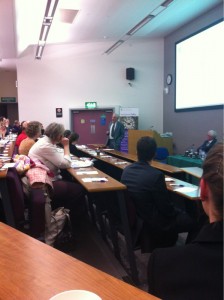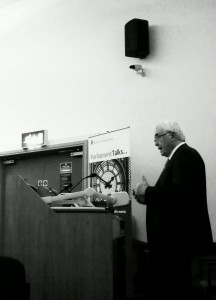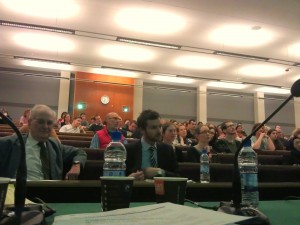
March 19, 2012, by Simon Gosling
Simon Gosling talks on Science and Parliament
Last Thursday evening I was seated on the panel for a panel discussion on the role of science in Parliament and Government.
I was joined by:
- Lord Willis of Knaresborough (Chair of the House of Lords Science & Technology Sub-Committee),
- Lord Oxburgh (Board Member of the Parliamentary Office of Science and Technology),
- Xameerah Malik (Specialist at the House of Commons Science & Technology Committee),
- Dr Stephen Allen (Environment and Energy Scientific Advisor at the Parliamentary Office of Science and Technology), and
- Dr Tom Crick (Senior Lecturer in Computer Science at Cardiff Met University).
The discussion was chaired by Len Tingle (BBC political editor for Yorkshire).
The event was an opportunity to explain the difference between Parliament and Government (there is a difference!) and to highlight the way that Parliament challenges Government policy and Science policy.
Some very interesting points were made during the discussion.
For instance, Lord Willis suggested that the UK Government needs to engage more with learned societies, such as The Royal Society, in order to inform Government decisions on science policy. He argued that in this sense, we are some way behind the U.S., where Government regularly engages with national scientific learned societies, such as the American Geophysical Union (AGU) or the National Academy of Sciences.
Lord Willis also highlighted that the role that Parliament plays in science and technology is so much more than just stating where there are problems and issues. It is more crucial that solutions to problems are suggested, implemented if feasible, and seen to have a positive impact on society.
This is something that I learned during my participation in the Royal Society Pairing Scheme, when I spent a week working with Mr Barry Gardiner MP (Ed Miliband’s Special Envoy for Climate Change and the Environment) in November 2011 – see my earlier blog posts. To this end, where appropriate, I now try to implement this ethos in my own research and writing – for instance, providing suggested solutions to alleviate some of the important effects of climate change.
Xameerah Malik provided an excellent overview of how Parliament is critical in maintaining and implementing solid, evidence-based decisions on science policy. This is especially important where public opinion on – and perception of – certain risks may be very different from the true scientific risk.
Xameerah used the example of the respective public and government reactions to the H1N1 (“swine flu”) pandemic in 2009-2010. Public perception of the risk was swayed greatly by media reports of “worst-case” scenarios, which suggested there would be tens of thousands of deaths across the globe from H1N1. However, the media – on the whole – failed to present a balanced view of the scientific risk and largely ignored the “medium” and “low” scenarios. Parliamentary science and scrutiny was able to step in at this stage, using scientific evidence from various scientific experts, to release advise and statements on what the real risk from H1N1 was.
This example is also very similar to one given by Professor Sir John Beddington (Government Chief Scientific Advisor) at a talk I attended in November 2011 at the Hoses of Parliament; with respect to Parliament’s response to the volcanic ash cloud in April 2010, which resulted in hundreds of flights being grounded.
An overarching theme of the discussions at “Parliament Talks…Science” was the way in which science is communicated. There were several questions to the panel, verbally and through Twitter during the panel discussion. Questions included:
- Should scientists or politicians communicate scientific results?
- Who is better at this communication?
- Would an increased number of MPs with a science background improve communication of science from scientists to policy?
- Do scientists always feel listened to?
- What happens when a scientific expert on a Parliamentary scientific committee disagrees with Government scientific policy?
- Do scientists get frustrated when their results are miscommunicated or not seen to influence policy?
Within the limited timeframe, we started to answer some of these questions and propose solutions, but as with all discussions, it would have been wonderful to have had longer.
These questions, and others on communicating science and uncertainty in science to policy-makers and the public, is the focus of an interdisciplinary group of academics led by Professor Sarah Metcalfe who are exploring the challenges of ‘Representing and communicating uncertainty: climate change and risk’ in two workshops funded by an AHRC Science in Culture Exploratory Award (work linked to the University’s Natural Hazards and Disaster Mitigation Working Group).
For further information on the AHRC award please email: Lowri.Jones@nottingham.ac.uk
Simon Gosling (Lecturer in Physical Geography)
Email: simon.gosling@nottingham.ac.uk
Twitter: @simon_gosling




Very interesting event. Of course it’s a good idea that the government & legislature work closely with bodies such as the Royal Society to promote the sciences and research and innovation but there is always a risk of being seen to be “too” cosy. And I don’t think the H1N1 example is a good one or at best it shows government to be out of touch with reality. They bought so much vaccine and paid so much when the risks were so low and less than 1% of people caught it. Perhaps that just proves that the government and the legislature need to work more closely with bodies in science.